Implications of 21st Century Citizenship on Culture and Welfare
VerifiedAdded on 2023/01/12
|12
|3705
|83
Essay
AI Summary
This essay provides an overview of 21st-century citizenship and welfare, highlighting the evolving definition of citizenship in the digital age and the skills required to be a global citizen. It evaluates issues such as the strained relationship between citizens and the state, economic and educational inequalities, and the implications of these challenges on culture and education. The essay also emphasizes the importance of critical thinking and problem-solving skills for navigating the complexities of modern citizenship, while addressing the need for redefining the relationship between the state and its citizens to better fit the current era. The document is available on Desklib, a platform offering a wide range of study resources for students.
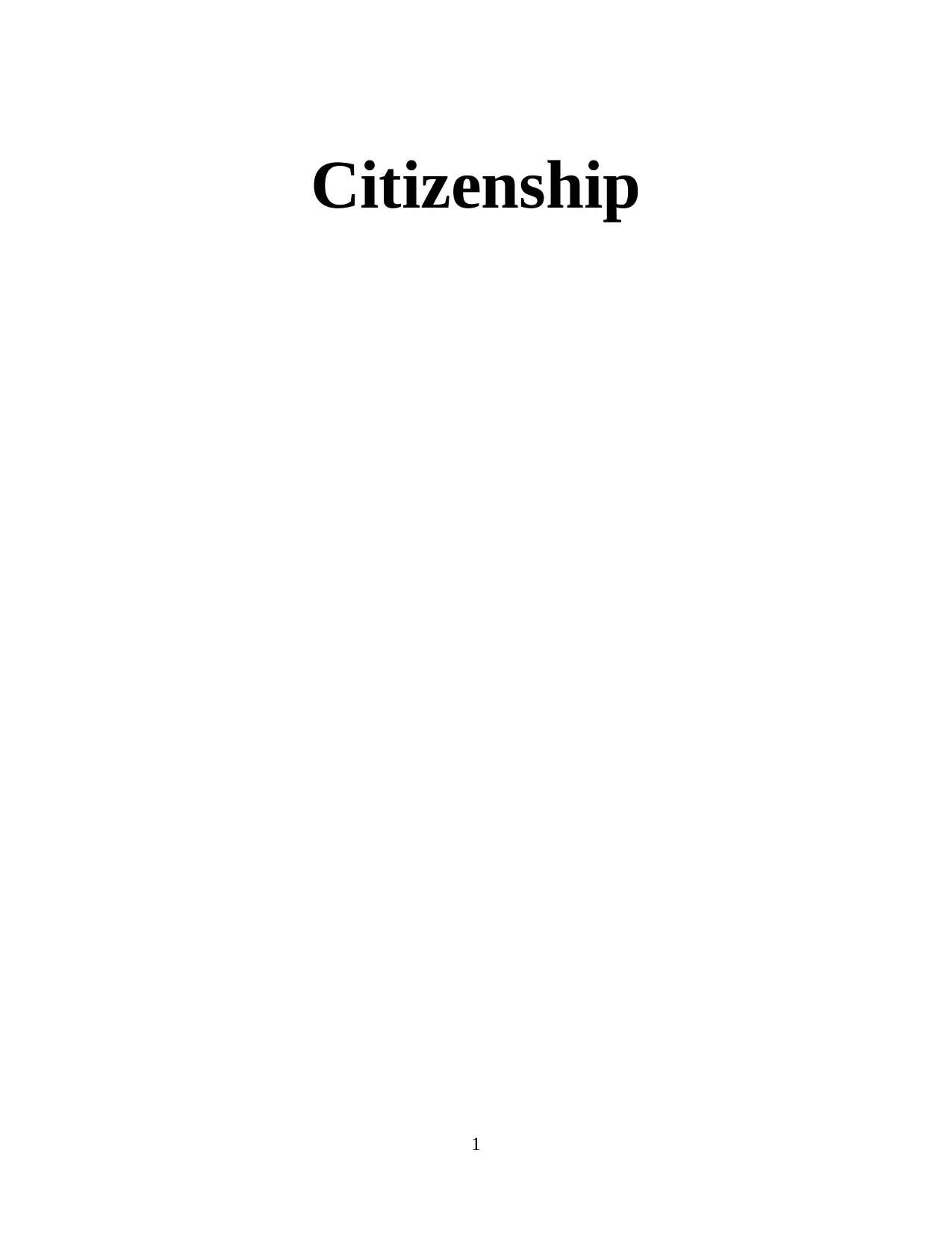
Citizenship
1
1
Paraphrase This Document
Need a fresh take? Get an instant paraphrase of this document with our AI Paraphraser
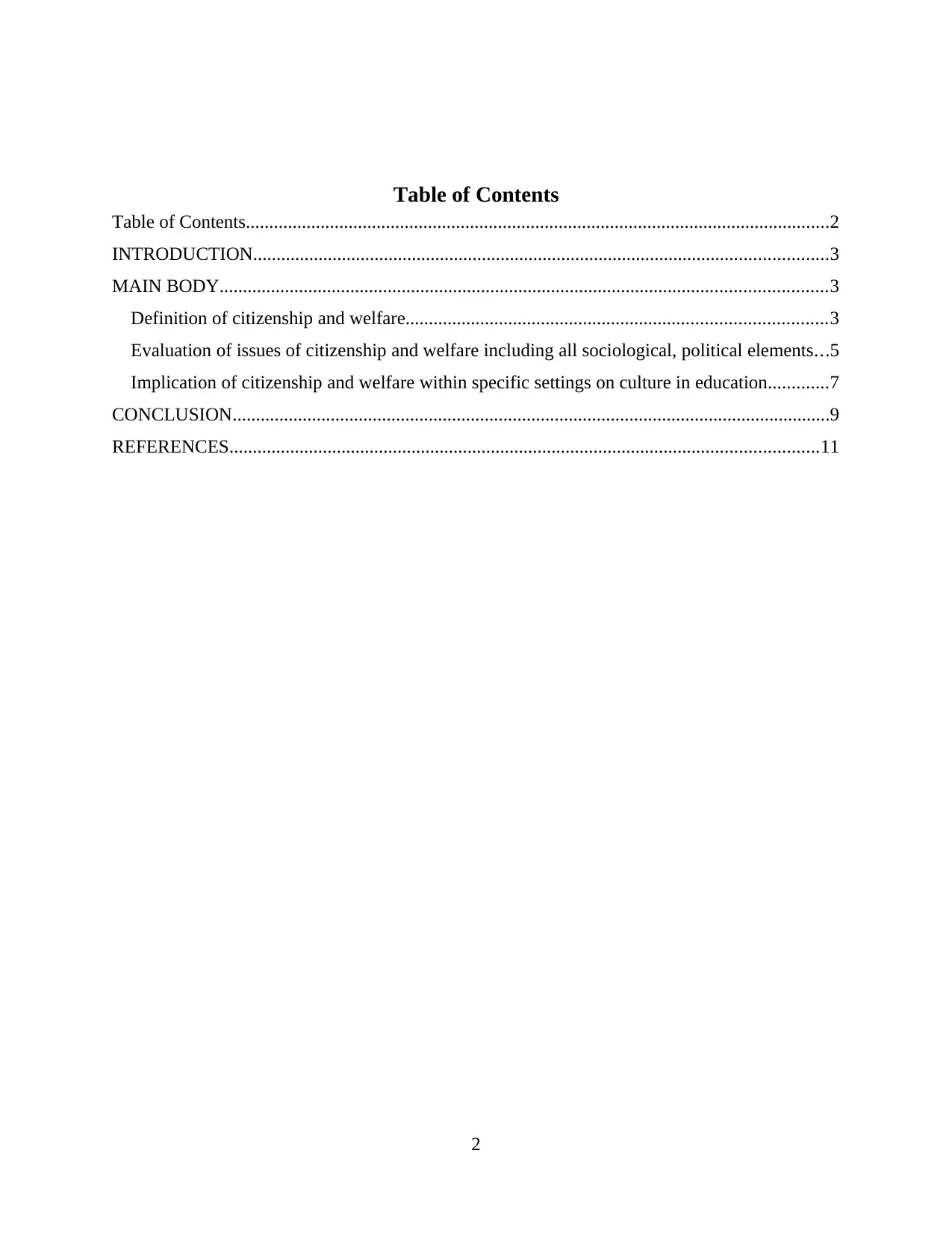
Table of Contents
Table of Contents.............................................................................................................................2
INTRODUCTION...........................................................................................................................3
MAIN BODY..................................................................................................................................3
Definition of citizenship and welfare..........................................................................................3
Evaluation of issues of citizenship and welfare including all sociological, political elements...5
Implication of citizenship and welfare within specific settings on culture in education.............7
CONCLUSION................................................................................................................................9
REFERENCES..............................................................................................................................11
2
Table of Contents.............................................................................................................................2
INTRODUCTION...........................................................................................................................3
MAIN BODY..................................................................................................................................3
Definition of citizenship and welfare..........................................................................................3
Evaluation of issues of citizenship and welfare including all sociological, political elements...5
Implication of citizenship and welfare within specific settings on culture in education.............7
CONCLUSION................................................................................................................................9
REFERENCES..............................................................................................................................11
2
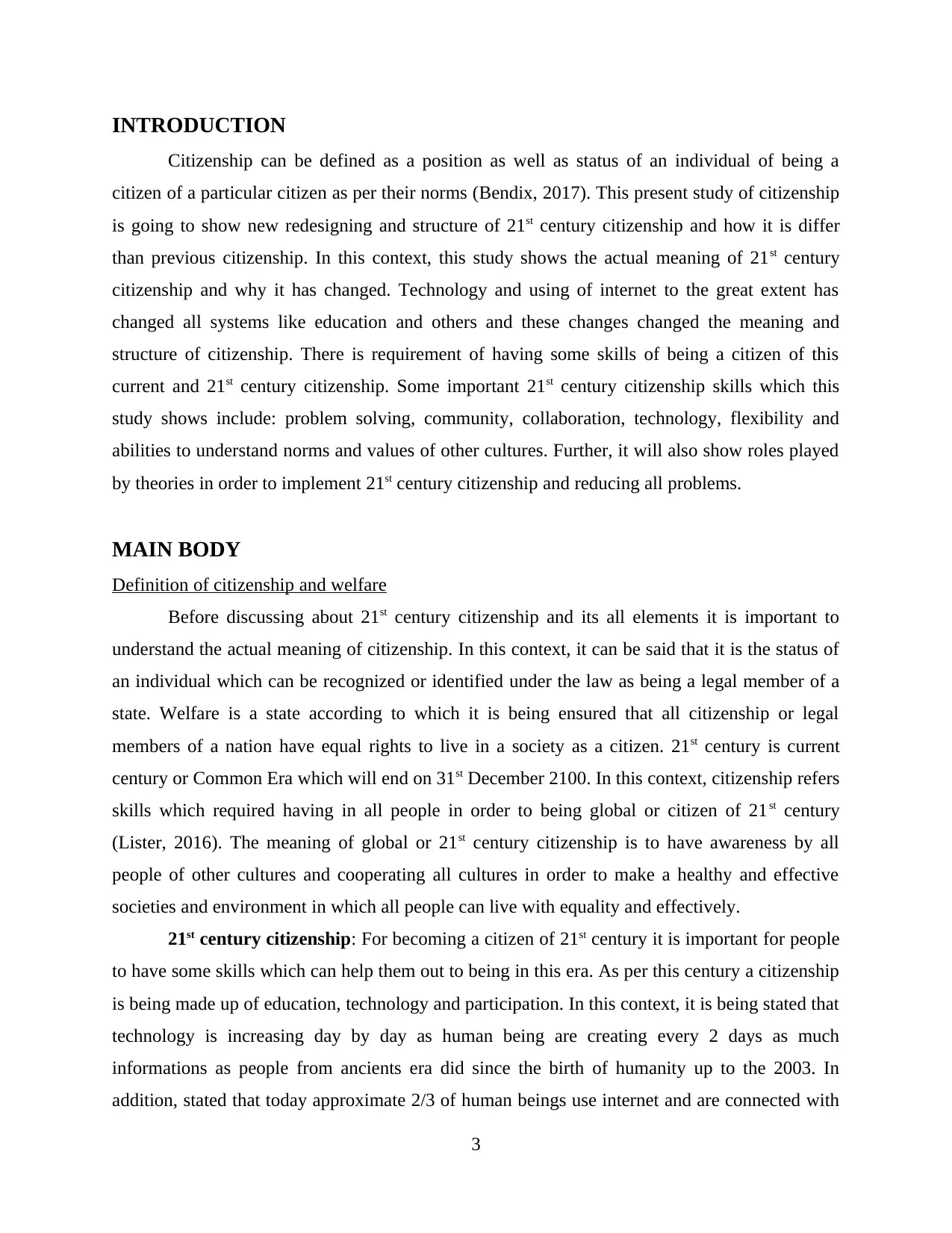
INTRODUCTION
Citizenship can be defined as a position as well as status of an individual of being a
citizen of a particular citizen as per their norms (Bendix, 2017). This present study of citizenship
is going to show new redesigning and structure of 21st century citizenship and how it is differ
than previous citizenship. In this context, this study shows the actual meaning of 21st century
citizenship and why it has changed. Technology and using of internet to the great extent has
changed all systems like education and others and these changes changed the meaning and
structure of citizenship. There is requirement of having some skills of being a citizen of this
current and 21st century citizenship. Some important 21st century citizenship skills which this
study shows include: problem solving, community, collaboration, technology, flexibility and
abilities to understand norms and values of other cultures. Further, it will also show roles played
by theories in order to implement 21st century citizenship and reducing all problems.
MAIN BODY
Definition of citizenship and welfare
Before discussing about 21st century citizenship and its all elements it is important to
understand the actual meaning of citizenship. In this context, it can be said that it is the status of
an individual which can be recognized or identified under the law as being a legal member of a
state. Welfare is a state according to which it is being ensured that all citizenship or legal
members of a nation have equal rights to live in a society as a citizen. 21st century is current
century or Common Era which will end on 31st December 2100. In this context, citizenship refers
skills which required having in all people in order to being global or citizen of 21st century
(Lister, 2016). The meaning of global or 21st century citizenship is to have awareness by all
people of other cultures and cooperating all cultures in order to make a healthy and effective
societies and environment in which all people can live with equality and effectively.
21st century citizenship: For becoming a citizen of 21st century it is important for people
to have some skills which can help them out to being in this era. As per this century a citizenship
is being made up of education, technology and participation. In this context, it is being stated that
technology is increasing day by day as human being are creating every 2 days as much
informations as people from ancients era did since the birth of humanity up to the 2003. In
addition, stated that today approximate 2/3 of human beings use internet and are connected with
3
Citizenship can be defined as a position as well as status of an individual of being a
citizen of a particular citizen as per their norms (Bendix, 2017). This present study of citizenship
is going to show new redesigning and structure of 21st century citizenship and how it is differ
than previous citizenship. In this context, this study shows the actual meaning of 21st century
citizenship and why it has changed. Technology and using of internet to the great extent has
changed all systems like education and others and these changes changed the meaning and
structure of citizenship. There is requirement of having some skills of being a citizen of this
current and 21st century citizenship. Some important 21st century citizenship skills which this
study shows include: problem solving, community, collaboration, technology, flexibility and
abilities to understand norms and values of other cultures. Further, it will also show roles played
by theories in order to implement 21st century citizenship and reducing all problems.
MAIN BODY
Definition of citizenship and welfare
Before discussing about 21st century citizenship and its all elements it is important to
understand the actual meaning of citizenship. In this context, it can be said that it is the status of
an individual which can be recognized or identified under the law as being a legal member of a
state. Welfare is a state according to which it is being ensured that all citizenship or legal
members of a nation have equal rights to live in a society as a citizen. 21st century is current
century or Common Era which will end on 31st December 2100. In this context, citizenship refers
skills which required having in all people in order to being global or citizen of 21st century
(Lister, 2016). The meaning of global or 21st century citizenship is to have awareness by all
people of other cultures and cooperating all cultures in order to make a healthy and effective
societies and environment in which all people can live with equality and effectively.
21st century citizenship: For becoming a citizen of 21st century it is important for people
to have some skills which can help them out to being in this era. As per this century a citizenship
is being made up of education, technology and participation. In this context, it is being stated that
technology is increasing day by day as human being are creating every 2 days as much
informations as people from ancients era did since the birth of humanity up to the 2003. In
addition, stated that today approximate 2/3 of human beings use internet and are connected with
3
⊘ This is a preview!⊘
Do you want full access?
Subscribe today to unlock all pages.

Trusted by 1+ million students worldwide
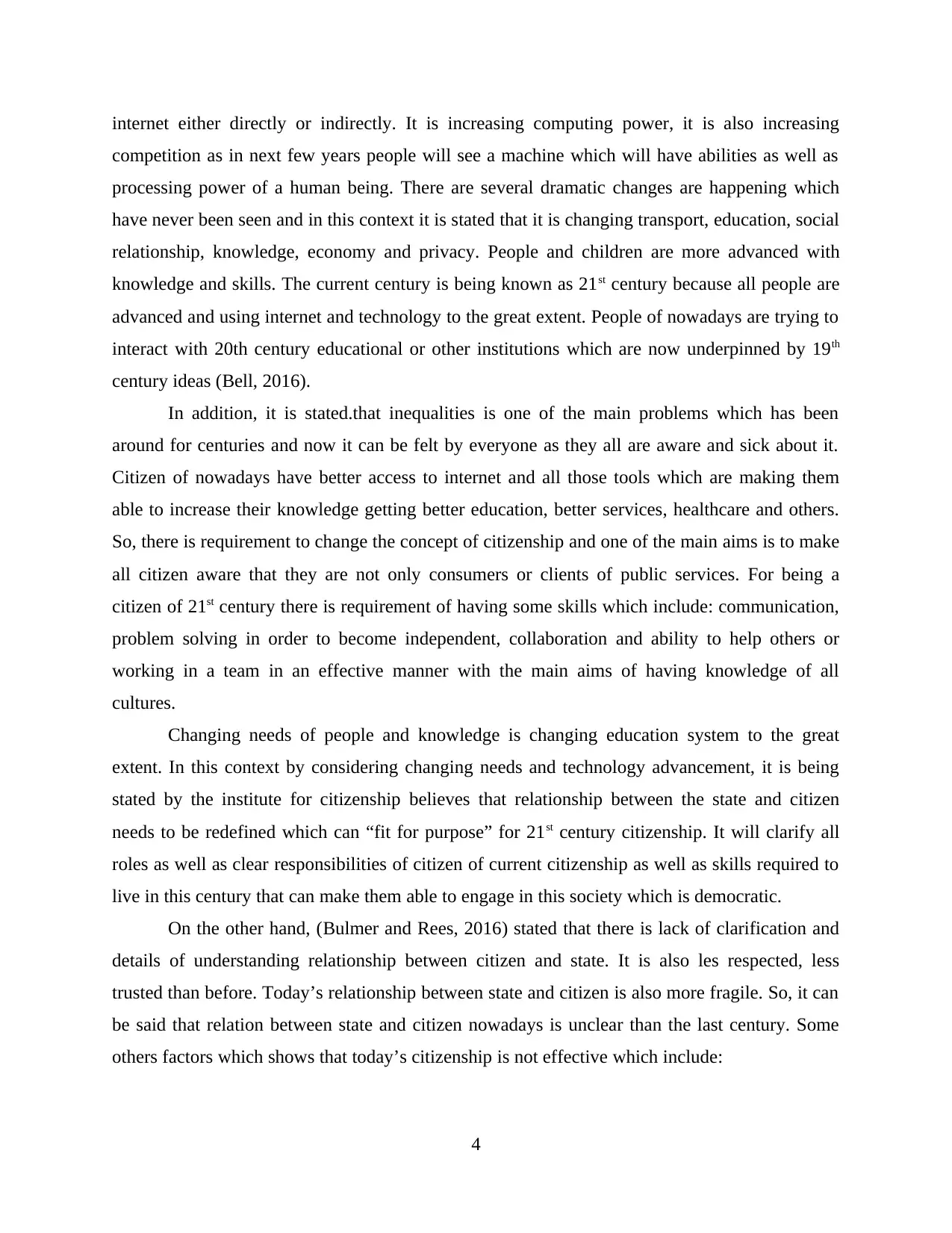
internet either directly or indirectly. It is increasing computing power, it is also increasing
competition as in next few years people will see a machine which will have abilities as well as
processing power of a human being. There are several dramatic changes are happening which
have never been seen and in this context it is stated that it is changing transport, education, social
relationship, knowledge, economy and privacy. People and children are more advanced with
knowledge and skills. The current century is being known as 21st century because all people are
advanced and using internet and technology to the great extent. People of nowadays are trying to
interact with 20th century educational or other institutions which are now underpinned by 19th
century ideas (Bell, 2016).
In addition, it is stated.that inequalities is one of the main problems which has been
around for centuries and now it can be felt by everyone as they all are aware and sick about it.
Citizen of nowadays have better access to internet and all those tools which are making them
able to increase their knowledge getting better education, better services, healthcare and others.
So, there is requirement to change the concept of citizenship and one of the main aims is to make
all citizen aware that they are not only consumers or clients of public services. For being a
citizen of 21st century there is requirement of having some skills which include: communication,
problem solving in order to become independent, collaboration and ability to help others or
working in a team in an effective manner with the main aims of having knowledge of all
cultures.
Changing needs of people and knowledge is changing education system to the great
extent. In this context by considering changing needs and technology advancement, it is being
stated by the institute for citizenship believes that relationship between the state and citizen
needs to be redefined which can “fit for purpose” for 21st century citizenship. It will clarify all
roles as well as clear responsibilities of citizen of current citizenship as well as skills required to
live in this century that can make them able to engage in this society which is democratic.
On the other hand, (Bulmer and Rees, 2016) stated that there is lack of clarification and
details of understanding relationship between citizen and state. It is also les respected, less
trusted than before. Today’s relationship between state and citizen is also more fragile. So, it can
be said that relation between state and citizen nowadays is unclear than the last century. Some
others factors which shows that today’s citizenship is not effective which include:
4
competition as in next few years people will see a machine which will have abilities as well as
processing power of a human being. There are several dramatic changes are happening which
have never been seen and in this context it is stated that it is changing transport, education, social
relationship, knowledge, economy and privacy. People and children are more advanced with
knowledge and skills. The current century is being known as 21st century because all people are
advanced and using internet and technology to the great extent. People of nowadays are trying to
interact with 20th century educational or other institutions which are now underpinned by 19th
century ideas (Bell, 2016).
In addition, it is stated.that inequalities is one of the main problems which has been
around for centuries and now it can be felt by everyone as they all are aware and sick about it.
Citizen of nowadays have better access to internet and all those tools which are making them
able to increase their knowledge getting better education, better services, healthcare and others.
So, there is requirement to change the concept of citizenship and one of the main aims is to make
all citizen aware that they are not only consumers or clients of public services. For being a
citizen of 21st century there is requirement of having some skills which include: communication,
problem solving in order to become independent, collaboration and ability to help others or
working in a team in an effective manner with the main aims of having knowledge of all
cultures.
Changing needs of people and knowledge is changing education system to the great
extent. In this context by considering changing needs and technology advancement, it is being
stated by the institute for citizenship believes that relationship between the state and citizen
needs to be redefined which can “fit for purpose” for 21st century citizenship. It will clarify all
roles as well as clear responsibilities of citizen of current citizenship as well as skills required to
live in this century that can make them able to engage in this society which is democratic.
On the other hand, (Bulmer and Rees, 2016) stated that there is lack of clarification and
details of understanding relationship between citizen and state. It is also les respected, less
trusted than before. Today’s relationship between state and citizen is also more fragile. So, it can
be said that relation between state and citizen nowadays is unclear than the last century. Some
others factors which shows that today’s citizenship is not effective which include:
4
Paraphrase This Document
Need a fresh take? Get an instant paraphrase of this document with our AI Paraphraser
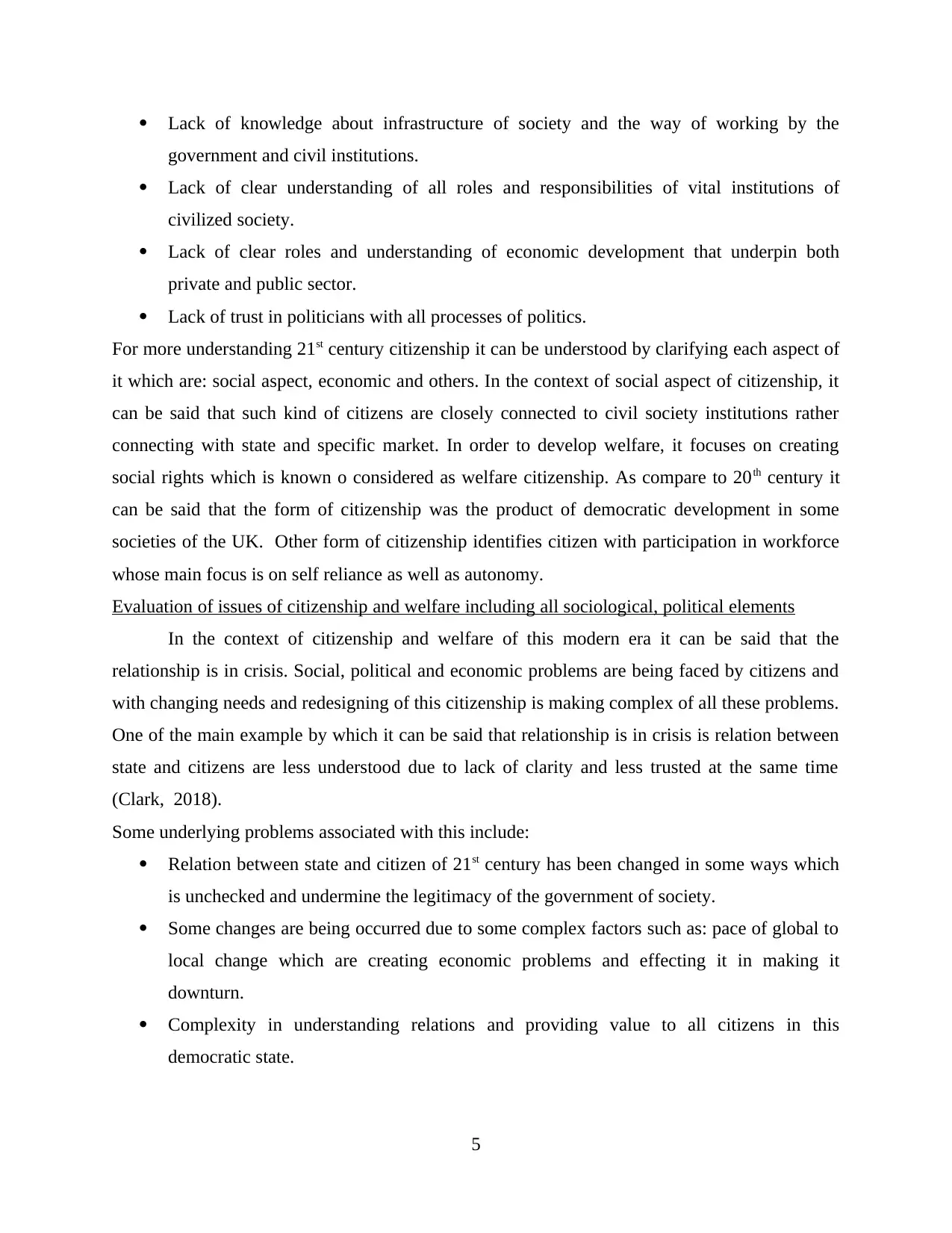
Lack of knowledge about infrastructure of society and the way of working by the
government and civil institutions.
Lack of clear understanding of all roles and responsibilities of vital institutions of
civilized society.
Lack of clear roles and understanding of economic development that underpin both
private and public sector.
Lack of trust in politicians with all processes of politics.
For more understanding 21st century citizenship it can be understood by clarifying each aspect of
it which are: social aspect, economic and others. In the context of social aspect of citizenship, it
can be said that such kind of citizens are closely connected to civil society institutions rather
connecting with state and specific market. In order to develop welfare, it focuses on creating
social rights which is known o considered as welfare citizenship. As compare to 20th century it
can be said that the form of citizenship was the product of democratic development in some
societies of the UK. Other form of citizenship identifies citizen with participation in workforce
whose main focus is on self reliance as well as autonomy.
Evaluation of issues of citizenship and welfare including all sociological, political elements
In the context of citizenship and welfare of this modern era it can be said that the
relationship is in crisis. Social, political and economic problems are being faced by citizens and
with changing needs and redesigning of this citizenship is making complex of all these problems.
One of the main example by which it can be said that relationship is in crisis is relation between
state and citizens are less understood due to lack of clarity and less trusted at the same time
(Clark, 2018).
Some underlying problems associated with this include:
Relation between state and citizen of 21st century has been changed in some ways which
is unchecked and undermine the legitimacy of the government of society.
Some changes are being occurred due to some complex factors such as: pace of global to
local change which are creating economic problems and effecting it in making it
downturn.
Complexity in understanding relations and providing value to all citizens in this
democratic state.
5
government and civil institutions.
Lack of clear understanding of all roles and responsibilities of vital institutions of
civilized society.
Lack of clear roles and understanding of economic development that underpin both
private and public sector.
Lack of trust in politicians with all processes of politics.
For more understanding 21st century citizenship it can be understood by clarifying each aspect of
it which are: social aspect, economic and others. In the context of social aspect of citizenship, it
can be said that such kind of citizens are closely connected to civil society institutions rather
connecting with state and specific market. In order to develop welfare, it focuses on creating
social rights which is known o considered as welfare citizenship. As compare to 20th century it
can be said that the form of citizenship was the product of democratic development in some
societies of the UK. Other form of citizenship identifies citizen with participation in workforce
whose main focus is on self reliance as well as autonomy.
Evaluation of issues of citizenship and welfare including all sociological, political elements
In the context of citizenship and welfare of this modern era it can be said that the
relationship is in crisis. Social, political and economic problems are being faced by citizens and
with changing needs and redesigning of this citizenship is making complex of all these problems.
One of the main example by which it can be said that relationship is in crisis is relation between
state and citizens are less understood due to lack of clarity and less trusted at the same time
(Clark, 2018).
Some underlying problems associated with this include:
Relation between state and citizen of 21st century has been changed in some ways which
is unchecked and undermine the legitimacy of the government of society.
Some changes are being occurred due to some complex factors such as: pace of global to
local change which are creating economic problems and effecting it in making it
downturn.
Complexity in understanding relations and providing value to all citizens in this
democratic state.
5
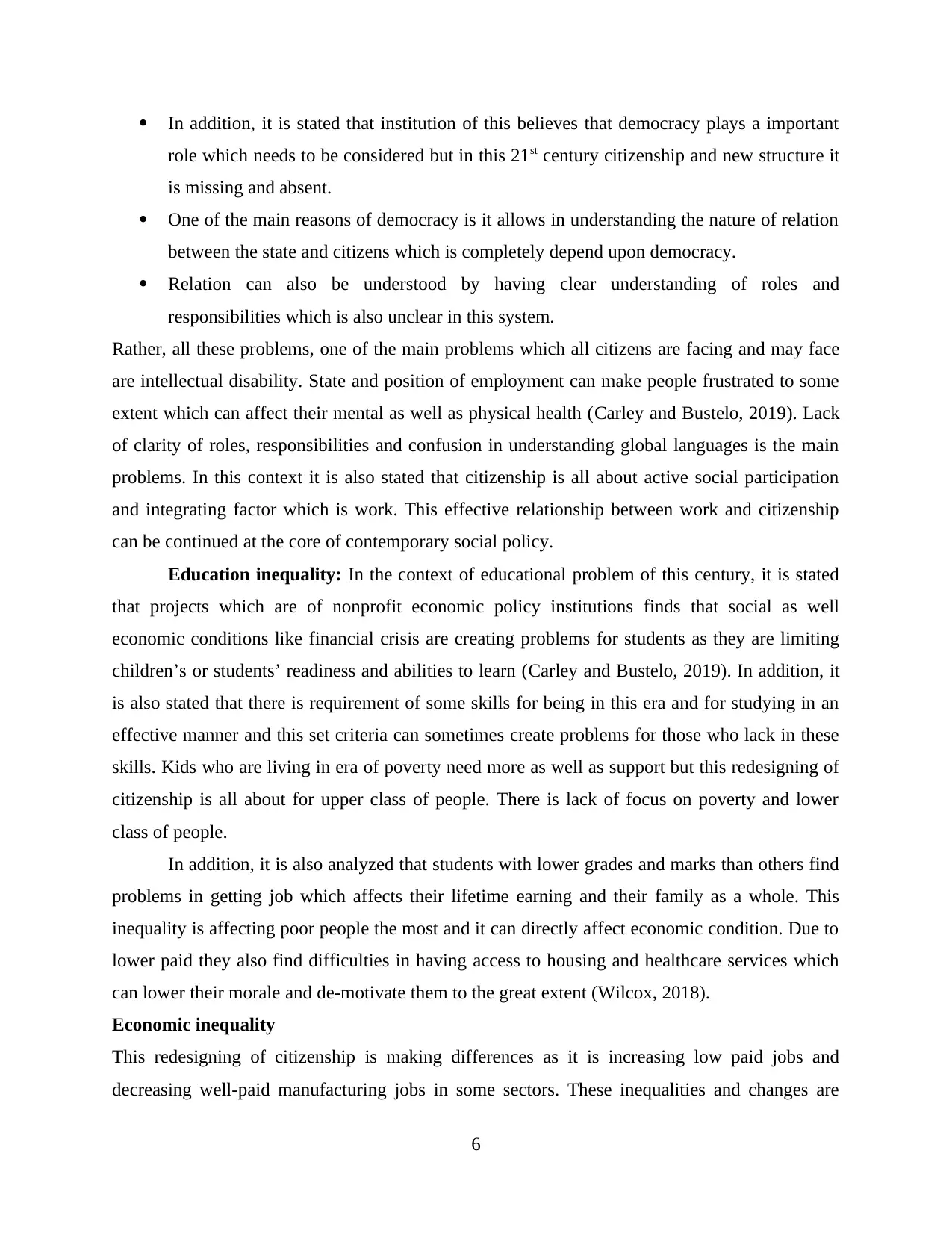
In addition, it is stated that institution of this believes that democracy plays a important
role which needs to be considered but in this 21st century citizenship and new structure it
is missing and absent.
One of the main reasons of democracy is it allows in understanding the nature of relation
between the state and citizens which is completely depend upon democracy.
Relation can also be understood by having clear understanding of roles and
responsibilities which is also unclear in this system.
Rather, all these problems, one of the main problems which all citizens are facing and may face
are intellectual disability. State and position of employment can make people frustrated to some
extent which can affect their mental as well as physical health (Carley and Bustelo, 2019). Lack
of clarity of roles, responsibilities and confusion in understanding global languages is the main
problems. In this context it is also stated that citizenship is all about active social participation
and integrating factor which is work. This effective relationship between work and citizenship
can be continued at the core of contemporary social policy.
Education inequality: In the context of educational problem of this century, it is stated
that projects which are of nonprofit economic policy institutions finds that social as well
economic conditions like financial crisis are creating problems for students as they are limiting
children’s or students’ readiness and abilities to learn (Carley and Bustelo, 2019). In addition, it
is also stated that there is requirement of some skills for being in this era and for studying in an
effective manner and this set criteria can sometimes create problems for those who lack in these
skills. Kids who are living in era of poverty need more as well as support but this redesigning of
citizenship is all about for upper class of people. There is lack of focus on poverty and lower
class of people.
In addition, it is also analyzed that students with lower grades and marks than others find
problems in getting job which affects their lifetime earning and their family as a whole. This
inequality is affecting poor people the most and it can directly affect economic condition. Due to
lower paid they also find difficulties in having access to housing and healthcare services which
can lower their morale and de-motivate them to the great extent (Wilcox, 2018).
Economic inequality
This redesigning of citizenship is making differences as it is increasing low paid jobs and
decreasing well-paid manufacturing jobs in some sectors. These inequalities and changes are
6
role which needs to be considered but in this 21st century citizenship and new structure it
is missing and absent.
One of the main reasons of democracy is it allows in understanding the nature of relation
between the state and citizens which is completely depend upon democracy.
Relation can also be understood by having clear understanding of roles and
responsibilities which is also unclear in this system.
Rather, all these problems, one of the main problems which all citizens are facing and may face
are intellectual disability. State and position of employment can make people frustrated to some
extent which can affect their mental as well as physical health (Carley and Bustelo, 2019). Lack
of clarity of roles, responsibilities and confusion in understanding global languages is the main
problems. In this context it is also stated that citizenship is all about active social participation
and integrating factor which is work. This effective relationship between work and citizenship
can be continued at the core of contemporary social policy.
Education inequality: In the context of educational problem of this century, it is stated
that projects which are of nonprofit economic policy institutions finds that social as well
economic conditions like financial crisis are creating problems for students as they are limiting
children’s or students’ readiness and abilities to learn (Carley and Bustelo, 2019). In addition, it
is also stated that there is requirement of some skills for being in this era and for studying in an
effective manner and this set criteria can sometimes create problems for those who lack in these
skills. Kids who are living in era of poverty need more as well as support but this redesigning of
citizenship is all about for upper class of people. There is lack of focus on poverty and lower
class of people.
In addition, it is also analyzed that students with lower grades and marks than others find
problems in getting job which affects their lifetime earning and their family as a whole. This
inequality is affecting poor people the most and it can directly affect economic condition. Due to
lower paid they also find difficulties in having access to housing and healthcare services which
can lower their morale and de-motivate them to the great extent (Wilcox, 2018).
Economic inequality
This redesigning of citizenship is making differences as it is increasing low paid jobs and
decreasing well-paid manufacturing jobs in some sectors. These inequalities and changes are
6
⊘ This is a preview!⊘
Do you want full access?
Subscribe today to unlock all pages.

Trusted by 1+ million students worldwide
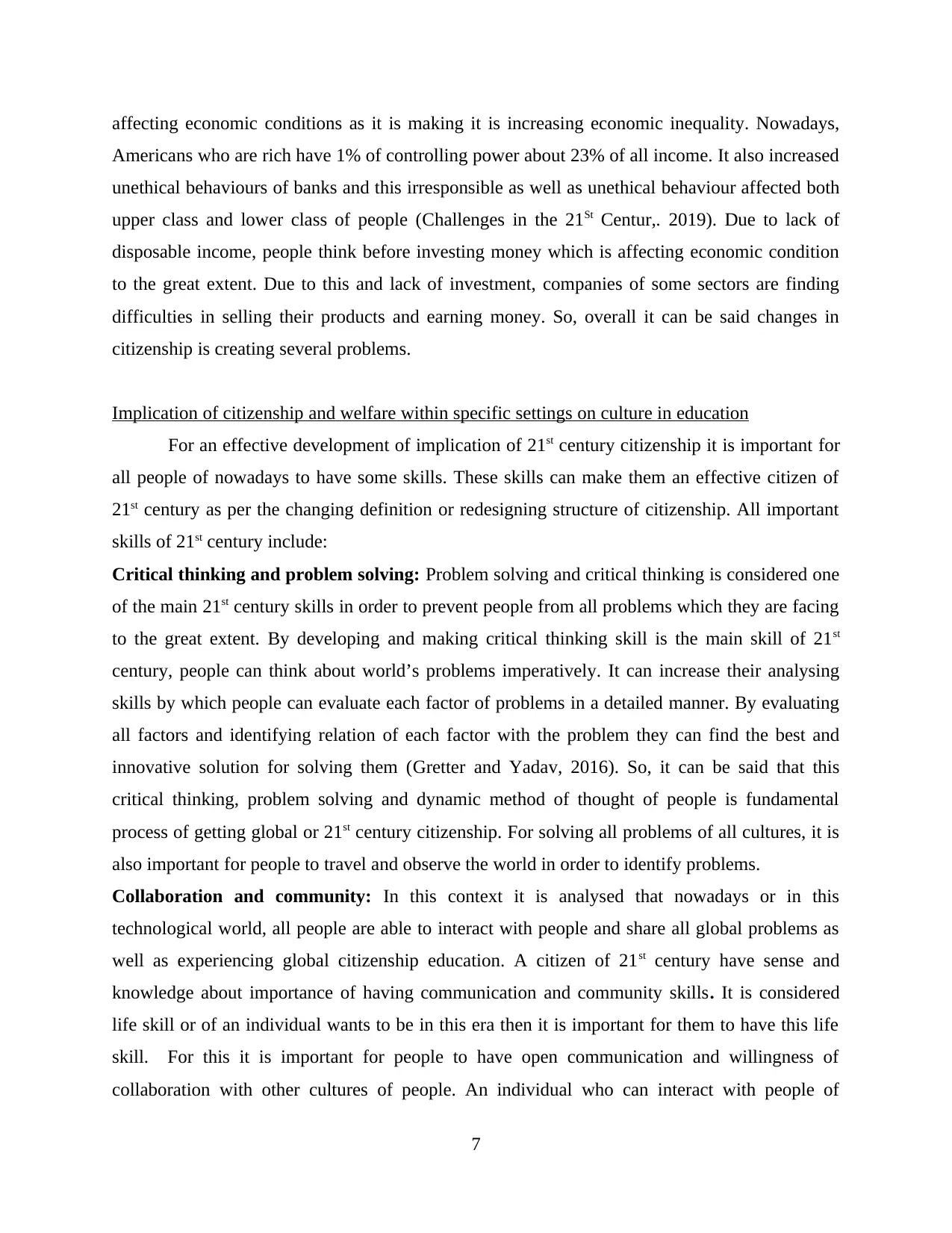
affecting economic conditions as it is making it is increasing economic inequality. Nowadays,
Americans who are rich have 1% of controlling power about 23% of all income. It also increased
unethical behaviours of banks and this irresponsible as well as unethical behaviour affected both
upper class and lower class of people (Challenges in the 21St Centur,. 2019). Due to lack of
disposable income, people think before investing money which is affecting economic condition
to the great extent. Due to this and lack of investment, companies of some sectors are finding
difficulties in selling their products and earning money. So, overall it can be said changes in
citizenship is creating several problems.
Implication of citizenship and welfare within specific settings on culture in education
For an effective development of implication of 21st century citizenship it is important for
all people of nowadays to have some skills. These skills can make them an effective citizen of
21st century as per the changing definition or redesigning structure of citizenship. All important
skills of 21st century include:
Critical thinking and problem solving: Problem solving and critical thinking is considered one
of the main 21st century skills in order to prevent people from all problems which they are facing
to the great extent. By developing and making critical thinking skill is the main skill of 21st
century, people can think about world’s problems imperatively. It can increase their analysing
skills by which people can evaluate each factor of problems in a detailed manner. By evaluating
all factors and identifying relation of each factor with the problem they can find the best and
innovative solution for solving them (Gretter and Yadav, 2016). So, it can be said that this
critical thinking, problem solving and dynamic method of thought of people is fundamental
process of getting global or 21st century citizenship. For solving all problems of all cultures, it is
also important for people to travel and observe the world in order to identify problems.
Collaboration and community: In this context it is analysed that nowadays or in this
technological world, all people are able to interact with people and share all global problems as
well as experiencing global citizenship education. A citizen of 21st century have sense and
knowledge about importance of having communication and community skills. It is considered
life skill or of an individual wants to be in this era then it is important for them to have this life
skill. For this it is important for people to have open communication and willingness of
collaboration with other cultures of people. An individual who can interact with people of
7
Americans who are rich have 1% of controlling power about 23% of all income. It also increased
unethical behaviours of banks and this irresponsible as well as unethical behaviour affected both
upper class and lower class of people (Challenges in the 21St Centur,. 2019). Due to lack of
disposable income, people think before investing money which is affecting economic condition
to the great extent. Due to this and lack of investment, companies of some sectors are finding
difficulties in selling their products and earning money. So, overall it can be said changes in
citizenship is creating several problems.
Implication of citizenship and welfare within specific settings on culture in education
For an effective development of implication of 21st century citizenship it is important for
all people of nowadays to have some skills. These skills can make them an effective citizen of
21st century as per the changing definition or redesigning structure of citizenship. All important
skills of 21st century include:
Critical thinking and problem solving: Problem solving and critical thinking is considered one
of the main 21st century skills in order to prevent people from all problems which they are facing
to the great extent. By developing and making critical thinking skill is the main skill of 21st
century, people can think about world’s problems imperatively. It can increase their analysing
skills by which people can evaluate each factor of problems in a detailed manner. By evaluating
all factors and identifying relation of each factor with the problem they can find the best and
innovative solution for solving them (Gretter and Yadav, 2016). So, it can be said that this
critical thinking, problem solving and dynamic method of thought of people is fundamental
process of getting global or 21st century citizenship. For solving all problems of all cultures, it is
also important for people to travel and observe the world in order to identify problems.
Collaboration and community: In this context it is analysed that nowadays or in this
technological world, all people are able to interact with people and share all global problems as
well as experiencing global citizenship education. A citizen of 21st century have sense and
knowledge about importance of having communication and community skills. It is considered
life skill or of an individual wants to be in this era then it is important for them to have this life
skill. For this it is important for people to have open communication and willingness of
collaboration with other cultures of people. An individual who can interact with people of
7
Paraphrase This Document
Need a fresh take? Get an instant paraphrase of this document with our AI Paraphraser
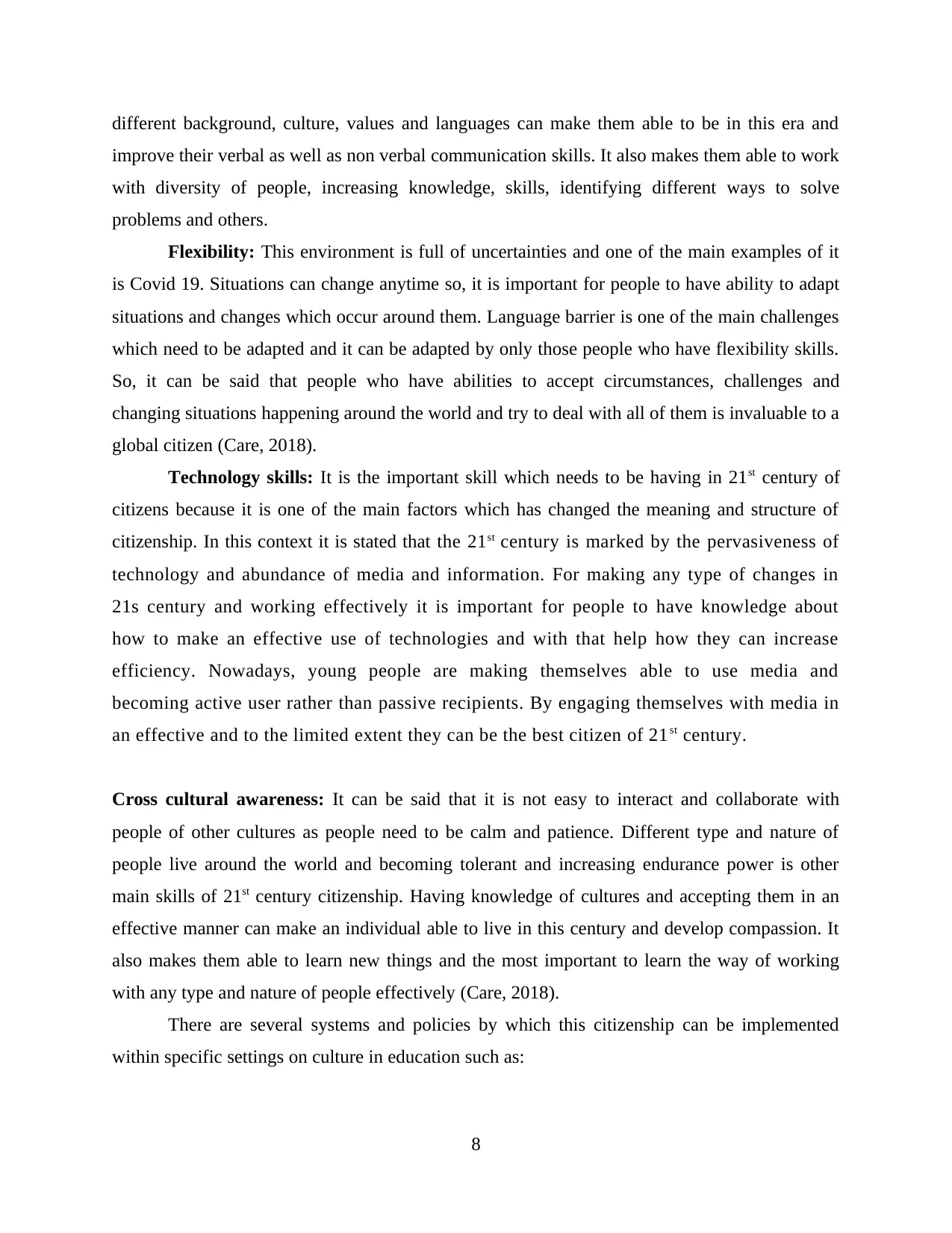
different background, culture, values and languages can make them able to be in this era and
improve their verbal as well as non verbal communication skills. It also makes them able to work
with diversity of people, increasing knowledge, skills, identifying different ways to solve
problems and others.
Flexibility: This environment is full of uncertainties and one of the main examples of it
is Covid 19. Situations can change anytime so, it is important for people to have ability to adapt
situations and changes which occur around them. Language barrier is one of the main challenges
which need to be adapted and it can be adapted by only those people who have flexibility skills.
So, it can be said that people who have abilities to accept circumstances, challenges and
changing situations happening around the world and try to deal with all of them is invaluable to a
global citizen (Care, 2018).
Technology skills: It is the important skill which needs to be having in 21st century of
citizens because it is one of the main factors which has changed the meaning and structure of
citizenship. In this context it is stated that the 21st century is marked by the pervasiveness of
technology and abundance of media and information. For making any type of changes in
21s century and working effectively it is important for people to have knowledge about
how to make an effective use of technologies and with that help how they can increase
efficiency. Nowadays, young people are making themselves able to use media and
becoming active user rather than passive recipients. By engaging themselves with media in
an effective and to the limited extent they can be the best citizen of 21st century.
Cross cultural awareness: It can be said that it is not easy to interact and collaborate with
people of other cultures as people need to be calm and patience. Different type and nature of
people live around the world and becoming tolerant and increasing endurance power is other
main skills of 21st century citizenship. Having knowledge of cultures and accepting them in an
effective manner can make an individual able to live in this century and develop compassion. It
also makes them able to learn new things and the most important to learn the way of working
with any type and nature of people effectively (Care, 2018).
There are several systems and policies by which this citizenship can be implemented
within specific settings on culture in education such as:
8
improve their verbal as well as non verbal communication skills. It also makes them able to work
with diversity of people, increasing knowledge, skills, identifying different ways to solve
problems and others.
Flexibility: This environment is full of uncertainties and one of the main examples of it
is Covid 19. Situations can change anytime so, it is important for people to have ability to adapt
situations and changes which occur around them. Language barrier is one of the main challenges
which need to be adapted and it can be adapted by only those people who have flexibility skills.
So, it can be said that people who have abilities to accept circumstances, challenges and
changing situations happening around the world and try to deal with all of them is invaluable to a
global citizen (Care, 2018).
Technology skills: It is the important skill which needs to be having in 21st century of
citizens because it is one of the main factors which has changed the meaning and structure of
citizenship. In this context it is stated that the 21st century is marked by the pervasiveness of
technology and abundance of media and information. For making any type of changes in
21s century and working effectively it is important for people to have knowledge about
how to make an effective use of technologies and with that help how they can increase
efficiency. Nowadays, young people are making themselves able to use media and
becoming active user rather than passive recipients. By engaging themselves with media in
an effective and to the limited extent they can be the best citizen of 21st century.
Cross cultural awareness: It can be said that it is not easy to interact and collaborate with
people of other cultures as people need to be calm and patience. Different type and nature of
people live around the world and becoming tolerant and increasing endurance power is other
main skills of 21st century citizenship. Having knowledge of cultures and accepting them in an
effective manner can make an individual able to live in this century and develop compassion. It
also makes them able to learn new things and the most important to learn the way of working
with any type and nature of people effectively (Care, 2018).
There are several systems and policies by which this citizenship can be implemented
within specific settings on culture in education such as:
8
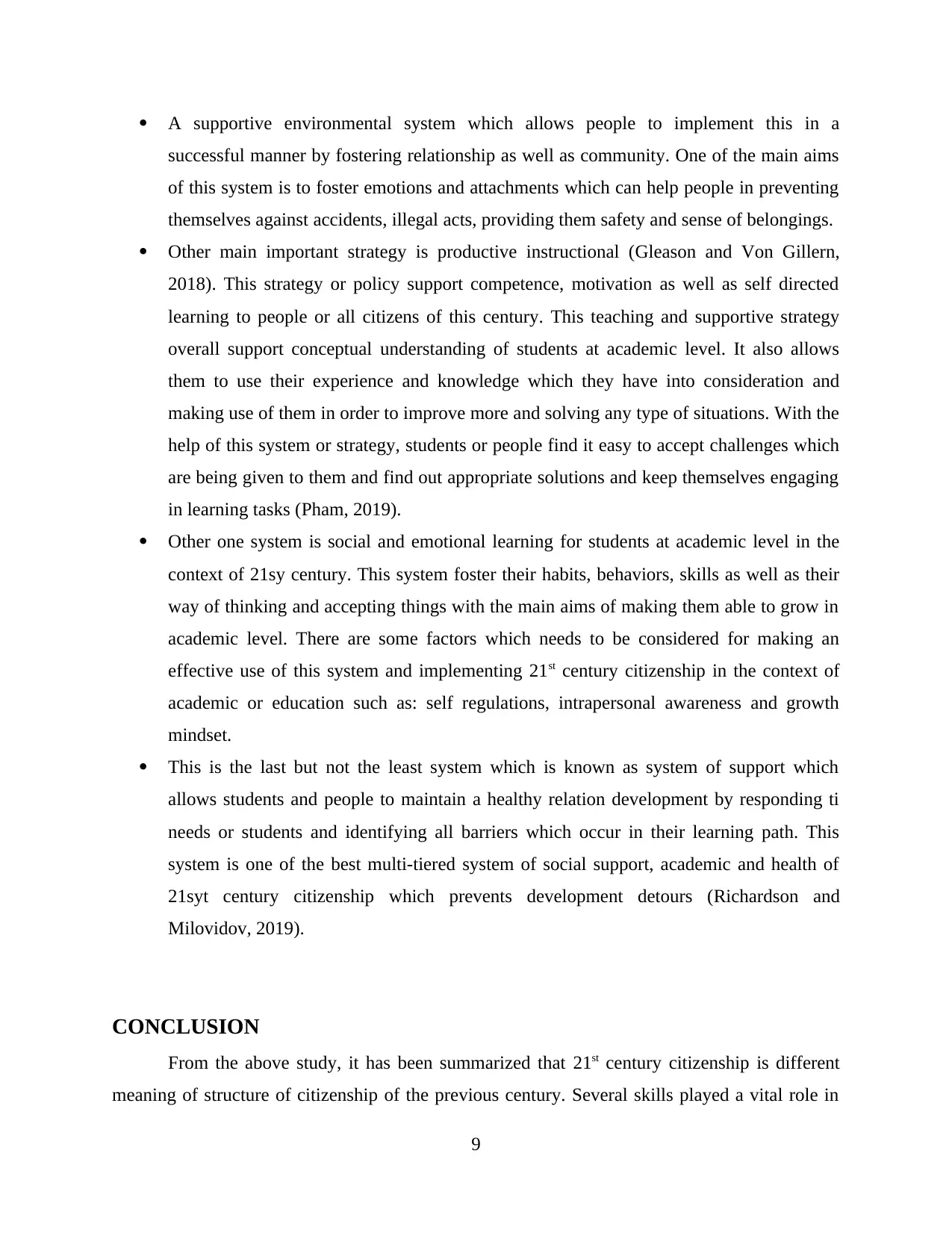
A supportive environmental system which allows people to implement this in a
successful manner by fostering relationship as well as community. One of the main aims
of this system is to foster emotions and attachments which can help people in preventing
themselves against accidents, illegal acts, providing them safety and sense of belongings.
Other main important strategy is productive instructional (Gleason and Von Gillern,
2018). This strategy or policy support competence, motivation as well as self directed
learning to people or all citizens of this century. This teaching and supportive strategy
overall support conceptual understanding of students at academic level. It also allows
them to use their experience and knowledge which they have into consideration and
making use of them in order to improve more and solving any type of situations. With the
help of this system or strategy, students or people find it easy to accept challenges which
are being given to them and find out appropriate solutions and keep themselves engaging
in learning tasks (Pham, 2019).
Other one system is social and emotional learning for students at academic level in the
context of 21sy century. This system foster their habits, behaviors, skills as well as their
way of thinking and accepting things with the main aims of making them able to grow in
academic level. There are some factors which needs to be considered for making an
effective use of this system and implementing 21st century citizenship in the context of
academic or education such as: self regulations, intrapersonal awareness and growth
mindset.
This is the last but not the least system which is known as system of support which
allows students and people to maintain a healthy relation development by responding ti
needs or students and identifying all barriers which occur in their learning path. This
system is one of the best multi-tiered system of social support, academic and health of
21syt century citizenship which prevents development detours (Richardson and
Milovidov, 2019).
CONCLUSION
From the above study, it has been summarized that 21st century citizenship is different
meaning of structure of citizenship of the previous century. Several skills played a vital role in
9
successful manner by fostering relationship as well as community. One of the main aims
of this system is to foster emotions and attachments which can help people in preventing
themselves against accidents, illegal acts, providing them safety and sense of belongings.
Other main important strategy is productive instructional (Gleason and Von Gillern,
2018). This strategy or policy support competence, motivation as well as self directed
learning to people or all citizens of this century. This teaching and supportive strategy
overall support conceptual understanding of students at academic level. It also allows
them to use their experience and knowledge which they have into consideration and
making use of them in order to improve more and solving any type of situations. With the
help of this system or strategy, students or people find it easy to accept challenges which
are being given to them and find out appropriate solutions and keep themselves engaging
in learning tasks (Pham, 2019).
Other one system is social and emotional learning for students at academic level in the
context of 21sy century. This system foster their habits, behaviors, skills as well as their
way of thinking and accepting things with the main aims of making them able to grow in
academic level. There are some factors which needs to be considered for making an
effective use of this system and implementing 21st century citizenship in the context of
academic or education such as: self regulations, intrapersonal awareness and growth
mindset.
This is the last but not the least system which is known as system of support which
allows students and people to maintain a healthy relation development by responding ti
needs or students and identifying all barriers which occur in their learning path. This
system is one of the best multi-tiered system of social support, academic and health of
21syt century citizenship which prevents development detours (Richardson and
Milovidov, 2019).
CONCLUSION
From the above study, it has been summarized that 21st century citizenship is different
meaning of structure of citizenship of the previous century. Several skills played a vital role in
9
⊘ This is a preview!⊘
Do you want full access?
Subscribe today to unlock all pages.

Trusted by 1+ million students worldwide
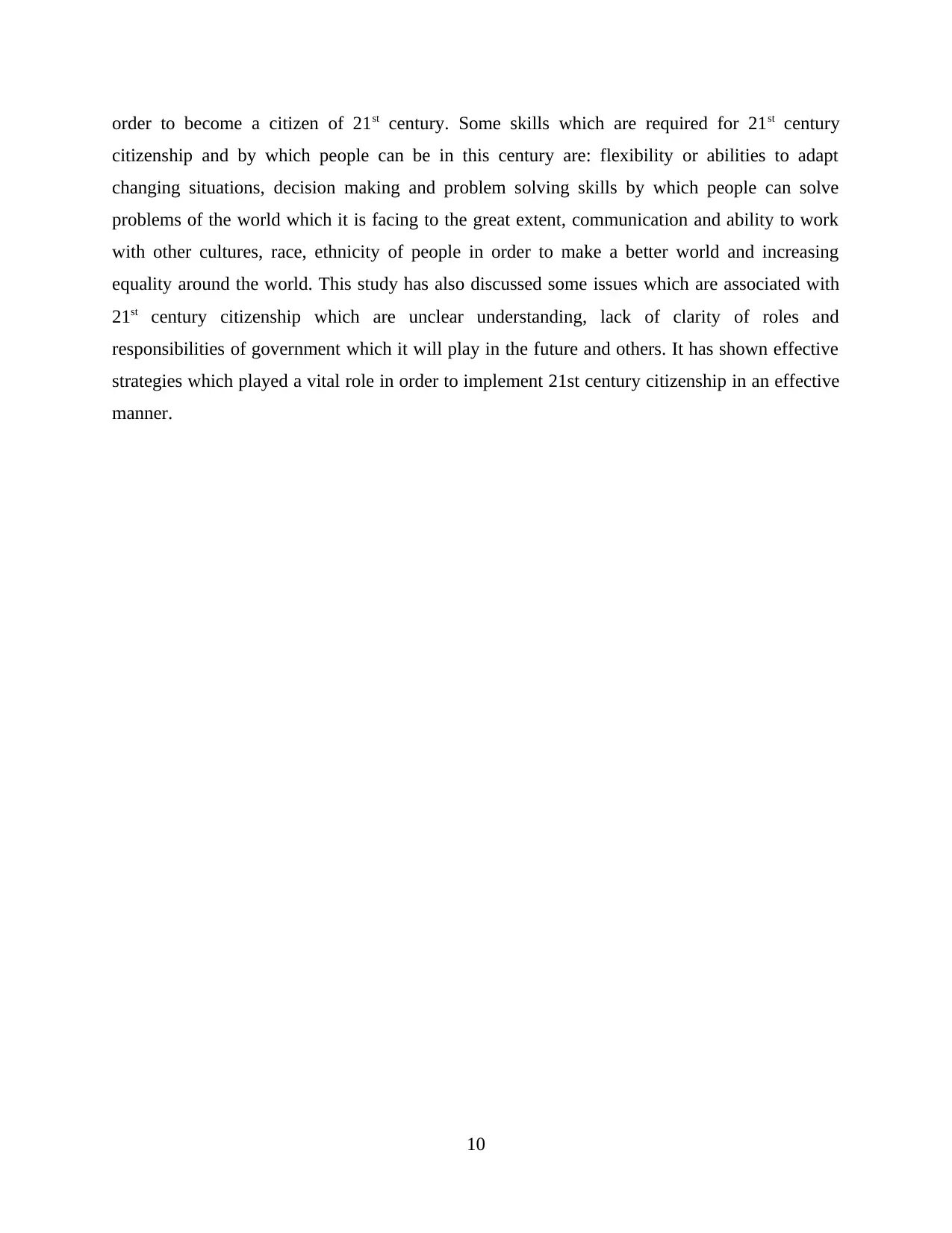
order to become a citizen of 21st century. Some skills which are required for 21st century
citizenship and by which people can be in this century are: flexibility or abilities to adapt
changing situations, decision making and problem solving skills by which people can solve
problems of the world which it is facing to the great extent, communication and ability to work
with other cultures, race, ethnicity of people in order to make a better world and increasing
equality around the world. This study has also discussed some issues which are associated with
21st century citizenship which are unclear understanding, lack of clarity of roles and
responsibilities of government which it will play in the future and others. It has shown effective
strategies which played a vital role in order to implement 21st century citizenship in an effective
manner.
10
citizenship and by which people can be in this century are: flexibility or abilities to adapt
changing situations, decision making and problem solving skills by which people can solve
problems of the world which it is facing to the great extent, communication and ability to work
with other cultures, race, ethnicity of people in order to make a better world and increasing
equality around the world. This study has also discussed some issues which are associated with
21st century citizenship which are unclear understanding, lack of clarity of roles and
responsibilities of government which it will play in the future and others. It has shown effective
strategies which played a vital role in order to implement 21st century citizenship in an effective
manner.
10
Paraphrase This Document
Need a fresh take? Get an instant paraphrase of this document with our AI Paraphraser
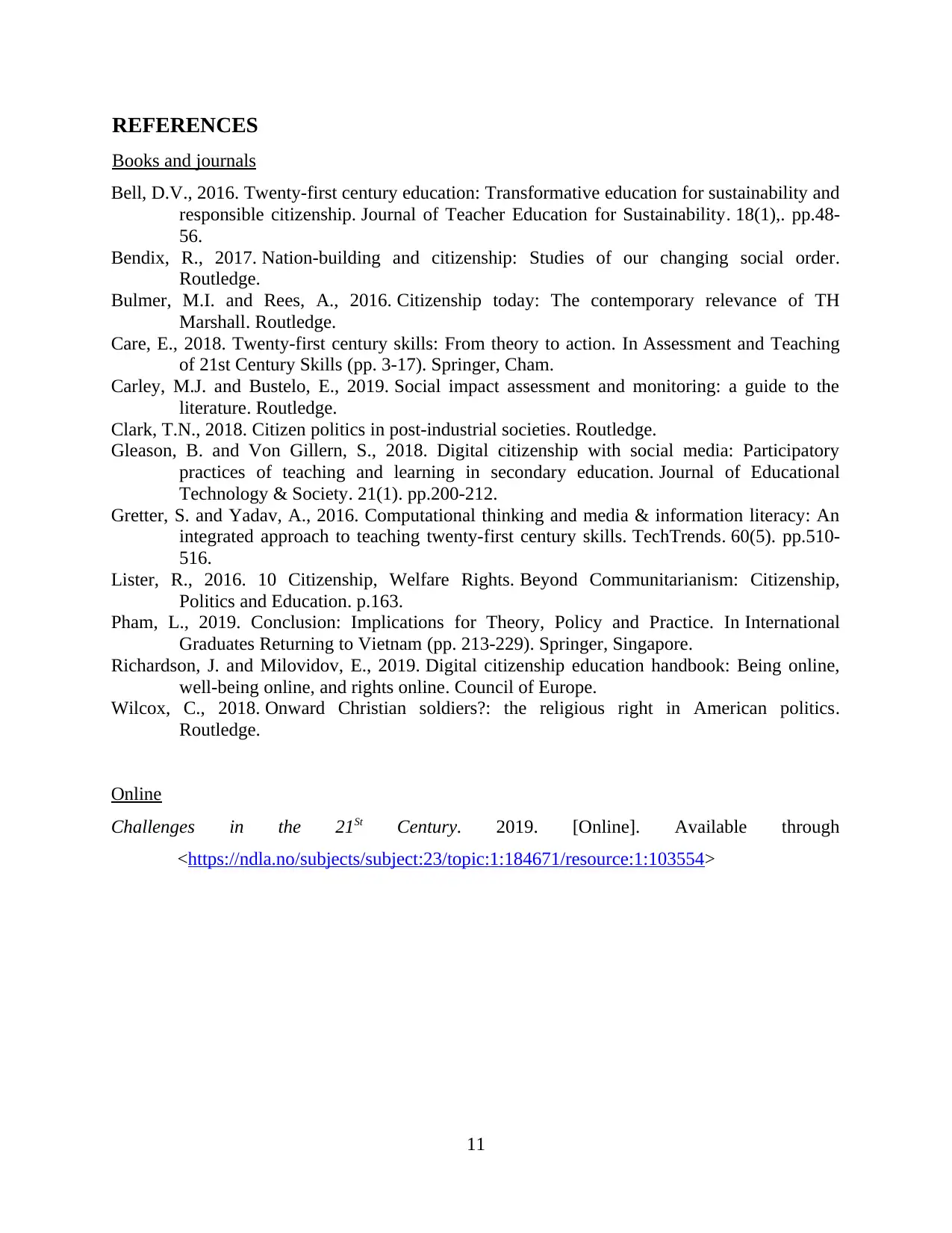
REFERENCES
Books and journals
Bell, D.V., 2016. Twenty-first century education: Transformative education for sustainability and
responsible citizenship. Journal of Teacher Education for Sustainability. 18(1),. pp.48-
56.
Bendix, R., 2017. Nation-building and citizenship: Studies of our changing social order.
Routledge.
Bulmer, M.I. and Rees, A., 2016. Citizenship today: The contemporary relevance of TH
Marshall. Routledge.
Care, E., 2018. Twenty-first century skills: From theory to action. In Assessment and Teaching
of 21st Century Skills (pp. 3-17). Springer, Cham.
Carley, M.J. and Bustelo, E., 2019. Social impact assessment and monitoring: a guide to the
literature. Routledge.
Clark, T.N., 2018. Citizen politics in post-industrial societies. Routledge.
Gleason, B. and Von Gillern, S., 2018. Digital citizenship with social media: Participatory
practices of teaching and learning in secondary education. Journal of Educational
Technology & Society. 21(1). pp.200-212.
Gretter, S. and Yadav, A., 2016. Computational thinking and media & information literacy: An
integrated approach to teaching twenty-first century skills. TechTrends. 60(5). pp.510-
516.
Lister, R., 2016. 10 Citizenship, Welfare Rights. Beyond Communitarianism: Citizenship,
Politics and Education. p.163.
Pham, L., 2019. Conclusion: Implications for Theory, Policy and Practice. In International
Graduates Returning to Vietnam (pp. 213-229). Springer, Singapore.
Richardson, J. and Milovidov, E., 2019. Digital citizenship education handbook: Being online,
well-being online, and rights online. Council of Europe.
Wilcox, C., 2018. Onward Christian soldiers?: the religious right in American politics.
Routledge.
Online
Challenges in the 21St Century. 2019. [Online]. Available through
<https://ndla.no/subjects/subject:23/topic:1:184671/resource:1:103554>
11
Books and journals
Bell, D.V., 2016. Twenty-first century education: Transformative education for sustainability and
responsible citizenship. Journal of Teacher Education for Sustainability. 18(1),. pp.48-
56.
Bendix, R., 2017. Nation-building and citizenship: Studies of our changing social order.
Routledge.
Bulmer, M.I. and Rees, A., 2016. Citizenship today: The contemporary relevance of TH
Marshall. Routledge.
Care, E., 2018. Twenty-first century skills: From theory to action. In Assessment and Teaching
of 21st Century Skills (pp. 3-17). Springer, Cham.
Carley, M.J. and Bustelo, E., 2019. Social impact assessment and monitoring: a guide to the
literature. Routledge.
Clark, T.N., 2018. Citizen politics in post-industrial societies. Routledge.
Gleason, B. and Von Gillern, S., 2018. Digital citizenship with social media: Participatory
practices of teaching and learning in secondary education. Journal of Educational
Technology & Society. 21(1). pp.200-212.
Gretter, S. and Yadav, A., 2016. Computational thinking and media & information literacy: An
integrated approach to teaching twenty-first century skills. TechTrends. 60(5). pp.510-
516.
Lister, R., 2016. 10 Citizenship, Welfare Rights. Beyond Communitarianism: Citizenship,
Politics and Education. p.163.
Pham, L., 2019. Conclusion: Implications for Theory, Policy and Practice. In International
Graduates Returning to Vietnam (pp. 213-229). Springer, Singapore.
Richardson, J. and Milovidov, E., 2019. Digital citizenship education handbook: Being online,
well-being online, and rights online. Council of Europe.
Wilcox, C., 2018. Onward Christian soldiers?: the religious right in American politics.
Routledge.
Online
Challenges in the 21St Century. 2019. [Online]. Available through
<https://ndla.no/subjects/subject:23/topic:1:184671/resource:1:103554>
11

12
⊘ This is a preview!⊘
Do you want full access?
Subscribe today to unlock all pages.

Trusted by 1+ million students worldwide
1 out of 12
Related Documents
Your All-in-One AI-Powered Toolkit for Academic Success.
+13062052269
info@desklib.com
Available 24*7 on WhatsApp / Email
![[object Object]](/_next/static/media/star-bottom.7253800d.svg)
Unlock your academic potential
Copyright © 2020–2025 A2Z Services. All Rights Reserved. Developed and managed by ZUCOL.



